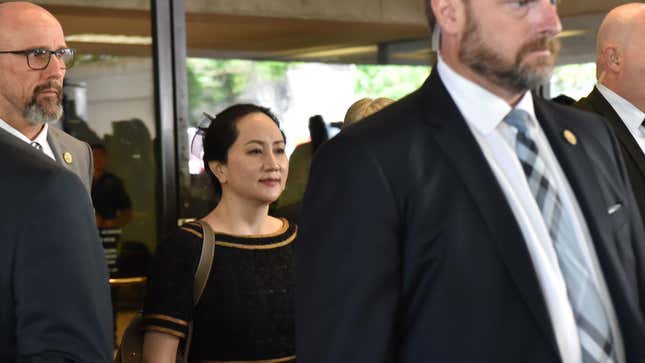
The chief financial officer of Chinese tech giant Huawei, Meng Wanzhou, is much likelier to end up facing prison time in the United States after her legal strategy to avoid extradition from Canada suffered a massive blow on Wednesday.
Meng is facing multiple charges in the U.S., where prosecutors have pegged her as the mastermind of a complicated plot to evade government sanctions on Iran, defrauding financial institutions in the process. However, first they have to secure her extradition from Canada, where she was detained in 2018 and later put under house arrest. Meng’s defense against being sent to the U.S. was to claim that the extradition attempt did not clear the key Canadian legal standard of “double criminality”—which requires that prosecutors demonstrate that the alleged actions would be a crime in both the U.S. and Canada.
That fell apart on Wednesday, per CNN, thanks to a ruling by British Columbia Supreme Court Associate Chief Justice Heather Holmes. Meng’s lawyers had argued that prosecutors hadn’t met the double criminality standard, as the sanctions are U.S. law, not Canadian. Holmes instead found that the alleged banking fraud would indeed constitute a crime in Canada.
Meng’s defense “would give fraud an artificially narrow scope in the extradition context,” Holmes wrote in the ruling, according to CNN.
In addition to the charges of banking fraud related to Meng’s alleged efforts to deceive financial institutions about Huawei’s relationship to subsidiary firms that did business with Iran, the indictment accuses her of trade theft and obstruction by destroying evidence related to the case. Huawei, the world’s largest telecommunications equipment manufacturer, is facing allegations that it could be spying for Chinese security services and its military, that it steals trade secrets, and that it ignores U.S. trade sanctions.
Details on alleged Huawei backdoors built into its telecommunications gear have not been publicly released, and there has been suspicion that the U.S. crusade against the company is partially motivated by the Trump administration’s desire to hold it hostage during the ongoing U.S.-China trade war. The firm is facing an increasing series of sanctions, including placement on Commerce Department blacklists. Meng is the daughter of the company’s founder and CEO, Ren Zhengfei.
According to the Times, Chinese state-owned outlet Global Times warned that a ruling against Meng on Wednesday that “panders to the Trump administration” would result in “resentment.” Former Canadian ambassador to China Guy Saint-Jacques told the paper that a worsening of relations between Canada and China was likely, with “both sides hardening their stances at a moment when countries are already questioning China’s role in the pandemic.”
The Canadian Department of Justice said in a statement to CNN that another hearing will “determine whether or not the alleged conduct provides sufficient evidence of the offense of fraud to meet the test for committal under the Extradition Act.”
“An independent judge will determine whether that test is met,” the agency added. “This speaks to the independence of Canada’s extradition process.”